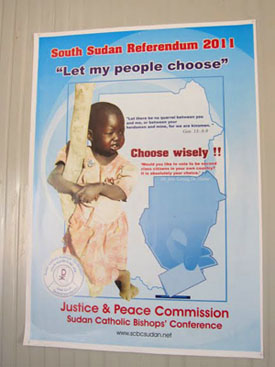
JUBA, Southern Sudan — 28 Days. That is the amount of time left for Sudan’s rival parties to resolve their differences over a law that will determine the critical details of southern Sudan’s looming, landmark self-determination referendum. In January 2011, southerners will vote to remain united with northern Sudan or to secede and become an independent state. The referendum holds enormous significance for Sudan and its peoples, both northerners and southerners, and the contentious negotiations between the North’s NCP and the South’s SPLM parties over the referendum law are one testament to this fact.
The referendum process, like the nationwide elections scheduled for April 2010, is already badly behind the schedule mandated by the Comprehensive Peace Agreement. But the southern referendum and the national elections are not even comparable in terms of importance for the people of southern Sudan. In Juba, the capital of the South, voter registration for the elections is underway. Over the weekend, as the month-long registration period kicked off, registration flyers appeared around town, on public buses and in traffic circles. But if you ask a Sudanese person on the street in Juba, say a motorcycle driver or a cell phone vendor, about the elections, you are not likely to hear great enthusiasm – or even general understanding – about the process. It’s hard to blame anyone for these sentiments: the elections process itself is enormously complex, and the polling period has been postponed twice (forcing it into the time period when preparations for the referendum should be the top priority). In addition, rising insecurity and violence give citizens in the South good reason to be nervous about even registering to vote or turning out to the polls when the time comes.
Check back later this week for more detailed analysis of these issues, but for now, back to 28 days. The NCP and SPLM, via their designated mediators for the referendum law negotiations, Ali Osman Taha (of the NCP) and Riek Machar (of the SPLM), seemed close to agreement a little over a week ago on the key bones of contention in the referendum law: namely, what is the threshold percentage of votes required for secession, and what percentage of voters must turn out to validate the referendum. Taha and Machar announced the good news, saying that after they conferred again with their respective parties, the bill could go to the National Assembly for a vote and would likely be passed into law.
More than a week later, rumors of sharp internal disagreement over the aforementioned key percentages within the SPLM have emerged, and the clock is still ticking. Meanwhile, Saturday marked the first outright appeal by the president of the Government of Southern Sudan, Salva Kiir, for southerners to vote for independence. President Kiir said at a prayer service in Juba:
When you reach your ballot boxes the choice is yours: you want to vote for unity so that you become a second class in your own country, that is your choice.
The referendum law must be passed in order for the Referendum Commission to be formed. The Commission will take the lead in organizing and conducting the referendum in January 2011. But the National Assembly must pass the law by November 30, before going on recess until after the April elections, when new members of the assembly will be elected. If the urgency is not evident in my tone, then I will say it outright: Time is running out. If the census and electoral processes in Sudan have taught anyone anything, it is that processes like an election with 12 ballots in Sudan, Africa’s largest country, take time. The leaders of the NCP and the SPLM owe it to their people to forge an agreement on the referendum law to initiate the preparation for this monumental event. This is, of course, easier said than done.

